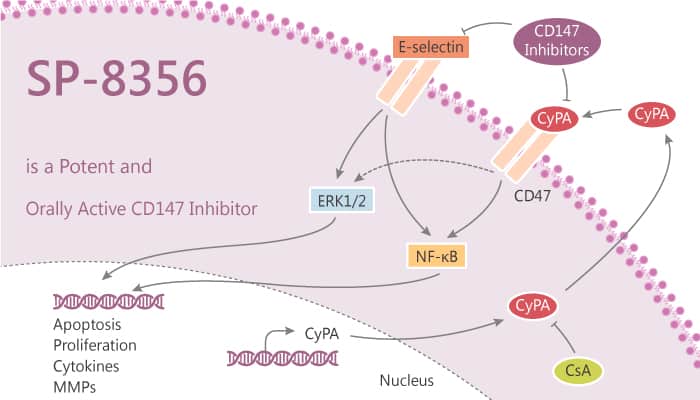Breast cancer is one of the most fatal diseases in women and exhibits high incidence and mortality among various cancers. Among various signaling pathways that promote tumor growth and progression, an inflammatory transcription factor NF-κB plays pivotal roles on cell proliferation and survival. Interestingly, NF-κB is highly activated in various types of cancers, including breast, bladder, prostate carcinoma, and melanoma. In breast cancer, aberrant constitutively active NF-κB exacerbates malignancy without hormonal dependency11. In addition, IKKβ is an essential kinase in the canonical NF-κB activation pathway. It induces phosphorylation and degradation of IκB and subsequent nuclear translocation of NF-κB. The suppression of NF-κB and components of its canonical activation pathway may provide useful targets for anti-cancer agents. SP-8356 exerts anti-breast cancer effects by inhibiting NF-κB signaling. In addition, SP-8356 is a potent, orally active cluster of differentiation 147 (CD147) inhibitor. It inhibits CD147-cyclophilin A (CypA) interaction and reduces MMP-9 activity.

SP-8356, a potent, orally active cluster of differentiation 147 (CD147) inhibitor, exerts anti-breast cancer effects by inhibiting NF-κB signaling.
SP-8356 inhibits breast cancer cell proliferation by mild cytotoxicity and cell cycle arrest. It significantly reduced the invasion of MDA-MB231 and 4T1 cells in a dose-dependent manner. SP-8356 also inhibits the transcriptional activity of NF- κB, which induces the expression of genes responsible for cell proliferation, survival, and motility. Moreover, SP-8356 downregulates metastasis and progression of breast cancer in a cell- and tissue-specific manner. Meanwhile, SP-8356 negatively regulates TNF-α-induced nuclear translocation of RelA/p65 by interfering with direct interaction between p65 and importin proteins. Furthermore, it inhibits transcription factors related to growth and motility of breast cancer cells SP-8356 attenuates cell migration-associated gene expression.
SP-8356 interfered with CD147-CypA interactions and attenuated matrix metalloproteinase-9 activation. Moreover, SP-8356 induced a decreased in atherosclerotic plaque size in ApoE KO mice and stabilized plaque vulnerability by reducing the necrotic lipid core, suppressing macrophage infiltration, and enhancing fibrous cap thickness through increasing the content of vascular smooth muscle cells. In addition, it exerts remarkable anti-atherosclerotic effects by suppressing plaque development and improving plaque stability through inhibiting CD147-CypA interactions.
In summary, SP-8356 is a multi-target agent possessing cancer-specific anti-metastatic activity both in vitro and in vivo, making it a promising therapy for aggressive breast cancer.
Reference:
Pahk K, et al. Int J Mol Sci. 2019 Dec 21;21(1). pii: E95.; Mander S, et al. Sci Rep. 2019 Apr 29;9(1):6595.